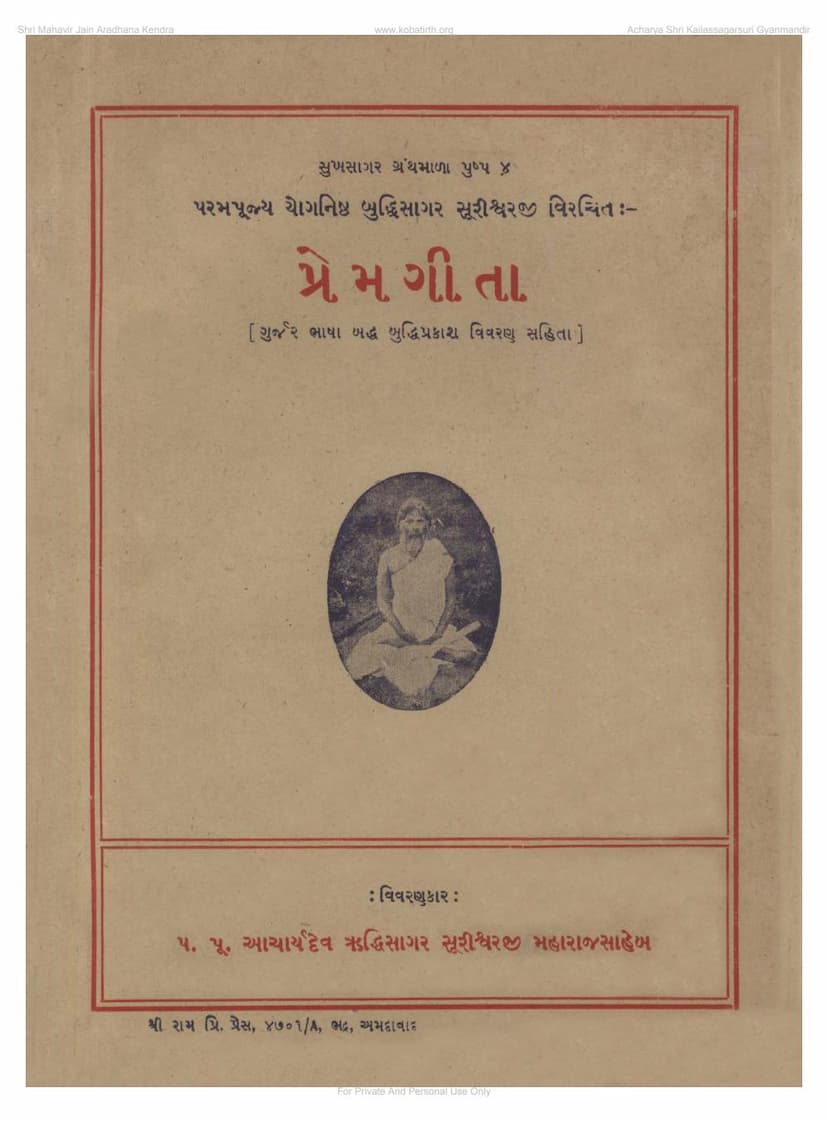Premgeeta Anuwad
Added to library: September 2, 2025

Summary
Here's a comprehensive summary of the Jain text "Premgeeta Anuwad" by Buddhisagar, based on the provided pages:
Title: Premgeeta Anuwad (प्रेमगीत अनुवाद) Author: Param Pujya Yognishth Buddhisagar Surishwarji Maharaj (परम पूज्य योगनिष्ठ बुद्धिसगर सूरीश्वरजी महाराज) Commentary (Vivaran): Pt. Pujya Acharya Dev Riddhisagar Surishwarji Maharaj (प. पू. आचार्य देव ૰द्धिसगूरिश्भरजी महाराज) Publisher: Shri Buddhisagar Jain Gyan Mandir (श्री बुद्धिसगर सूरि जैन ज्ञान मंदिर) Series: Sukhsagar Granthamala, Pushpa 4 (सुखसागर ग्रन्थमाला पुष्प ४) Year of Publication: V.S. 2007 (Vikram Samvat), Vir Samvat 2478, A.D. 1951
Overview:
"Premgeeta Anuwad" is a significant Jain scripture that translates and elaborates on the concept of "Prema" (Love) from a spiritual and Jain philosophical perspective. The book aims to clarify the true meaning of love, which has often been misunderstood and misused in the world. It emphasizes that true love, in the Jain tradition, is not merely a worldly emotion but a divine principle leading to liberation. The text was authored by the highly revered Yognishth Buddhisagar Surishwarji and meticulously commented upon by Acharya Riddhisagar Surishwarji.
Core Themes and Concepts:
-
The True Nature of Love (Prema): The "Premgeeta" stresses that love is the underlying cause of all joy and is inherent in the soul (Atma). It differentiates between worldly, transient love (often based on physical attraction or material possessions) and pure, spiritual love. True love, as expounded in the text, is characterized by:
- Friendship and Equality: It advocates for cultivating friendship (Maitri) towards all living beings, seeing them as equal to oneself.
- Absence of Attachment: True love transcends possessiveness and attachment to worldly objects or individuals.
- Focus on the Soul: The ultimate object of love is the pure, blissful, and knowledgeable nature of the soul (Atma).
- Detachment from the Material: Love for external, ephemeral things is considered a source of suffering and attachment to the cycle of birth and death.
-
Love as a Path to Liberation (Moksha): The text firmly establishes that pure love is not just an emotion but a potent spiritual practice that leads to the ultimate goal of Jainism – Moksha (liberation). By cultivating pure love towards the soul and the divine principles (like the Tirthankaras, enlightened beings, and the Jain Dharma), one can overcome karmic obstacles and attain liberation.
-
The Author and Commentator:
- Buddhisagar Surishwarji: A prolific author and yogi, he is credited with writing approximately 150 works. His spiritual prowess and deep understanding of Jain philosophy are evident in his profound teachings on love.
- Riddhisagar Surishwarji: As the principal disciple of Buddhisagarji, he provided an extensive and insightful commentary, "Buddhiprakash," to the "Premgeeta," making the profound concepts accessible to a wider audience. His commentary demonstrates extensive knowledge of both Jain and other philosophical traditions.
-
Distinguishing Pure from Impure Love: The "Premgeeta" meticulously analyzes the various forms of love:
- Ishtha (Desire): The general tendency to grasp at objects of affection.
- Murchha (Infatuation): A deep attachment that makes one forget reality, leading to a sense of oneness with material objects.
- Kama (Lust): The drive for sensory pleasures derived from objects of attachment.
- Sneha and Prema: These are identified as love/affection towards divine beings, gurus, and fellow spiritual practitioners, often expressed with joy and enthusiasm.
- Mamatva (Possessiveness): The feeling of "mine" towards both animate and inanimate objects.
- Abhinanda (Pleasure): The joy derived from seeing, knowing, and experiencing objects.
- Anugraha (Grace/Favor): Considered a form of love that is beneficial.
- The text strongly warns against impure forms of love stemming from attachment, desire, and ego, emphasizing their role in perpetuating the cycle of birth and death.
-
Love in the Current Era (Kali Yuga): The text acknowledges that in the current age (Kali Yuga), Dharma (righteousness) can be best practiced and understood through love. The devotion to the Tirthankaras and gurus is often fueled by this loving inclination.
-
Examples and Analogies: The text uses various examples and analogies to illustrate its points, drawing from Jain scriptures and philosophical reasoning. It emphasizes that true love is characterized by detachment, equanimity, and a focus on the spiritual essence.
-
The Importance of Discrimination (Viveka): The commentary highlights the critical role of discrimination (Viveka) in distinguishing between true and false love. Without viveka, one can be led astray by superficial affections.
-
The Ninefold Devotion (Navadha Bhakti): The text details the nine forms of devotion: listening (Shravana), singing praises (Kirtana), service (Sevana), respect (Adara), respectful speech (Vachana), prostration (Vandana), meditation (Dhyana), humility (Laghu-ta), and equanimity (Samata). These are presented as expressions of love and paths to spiritual advancement.
-
The Centrality of Mahavir Bhagwan: The teachings are framed around the supreme love and devotion for Lord Mahavir. His life, teachings, and compassion are presented as the epitome of true love. The text encourages chanting His name and meditating on His form.
-
Practical Application: The "Premgeeta" provides practical guidance on how to cultivate pure love in daily life, encompassing thoughts, words, and actions. It encourages selfless service, compassion, and a deep connection with the spiritual path.
Key Takeaways:
- Love as Universal: The text advocates for a universal, all-encompassing love that extends to all living beings, devoid of partiality or discrimination.
- Internal vs. External Love: It differentiates between external expressions of affection and the internal, unadulterated love for the soul.
- Detachment from Worldly Desires: True love is intrinsically linked with detachment from the transient pleasures and possessions of the material world.
- The Path to Purity: By understanding and practicing the principles of pure love, individuals can purify their minds, overcome negative emotions, and progress spiritually.
- The Ultimate Goal: The ultimate aim of this pure love is to realize the divine within, achieve liberation, and experience eternal bliss.
In essence, "Premgeeta Anuwad" is a profound spiritual discourse within the Jain tradition that aims to guide readers towards understanding and embodying divine love as the ultimate means to spiritual purification and liberation.